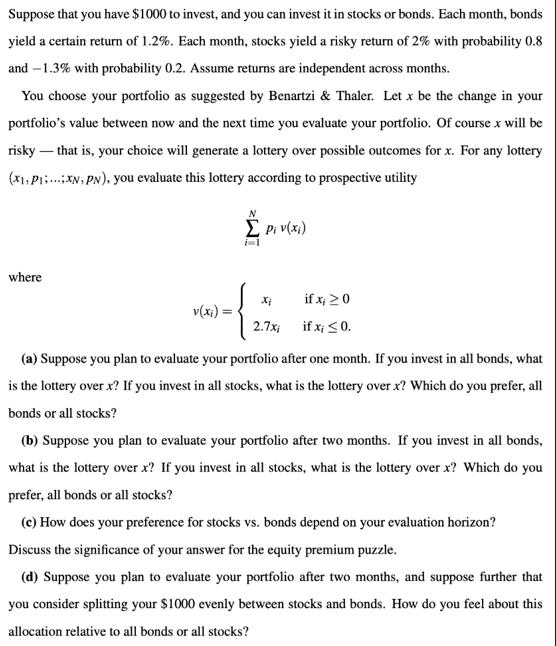Answered step by step
Verified Expert Solution
Question
1 Approved Answer
Suppose that you have $1000 to invest, and you can invest it in stocks or bonds. Each month, bonds yield a certain return of

Suppose that you have $1000 to invest, and you can invest it in stocks or bonds. Each month, bonds yield a certain return of 1.2%. Each month, stocks yield a risky return of 2% with probability 0.8 and -1.3% with probability 0.2. Assume returns are independent across months. You choose your portfolio as suggested by Benartzi & Thaler. Let x be the change in your portfolio's value between now and the next time you evaluate your portfolio. Of course x will be risky - that is, your choice will generate a lottery over possible outcomes for x. For any lottery (XI. PI...XN, PN), you evaluate this lottery according to prospective utility where N pi v(x;) Xi 2.7xi if xi 20 if xi 0. (a) Suppose you plan to evaluate your portfolio after one month. If you invest in all bonds, what is the lottery over x? If you invest in all stocks, what is the lottery over x? Which do you prefer, all bonds or all stocks? (b) Suppose you plan to evaluate your portfolio after two months. If you invest in all bonds, what is the lottery over x? If you invest in all stocks, what is the lottery over x? Which do you prefer, all bonds or all stocks? (c) How does your preference for stocks vs. bonds depend on your evaluation horizon? Discuss the significance of your answer for the equity premium puzzle. (d) Suppose you plan to evaluate your portfolio after two months, and suppose further that you consider splitting your $1000 evenly between stocks and bonds. How do you feel about this allocation relative to all bonds or all stocks?
Step by Step Solution
★★★★★
3.33 Rating (162 Votes )
There are 3 Steps involved in it
Step: 1
a If you invest in all bonds for one month the lottery over x would be a certain return of 12 This means that the value of your portfolio will increase by 12 after one month and the prospective utilit...
Get Instant Access to Expert-Tailored Solutions
See step-by-step solutions with expert insights and AI powered tools for academic success
Step: 2

Step: 3

Ace Your Homework with AI
Get the answers you need in no time with our AI-driven, step-by-step assistance
Get Started


